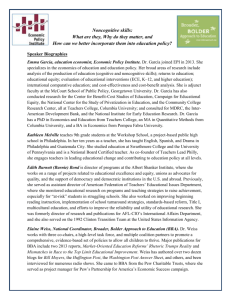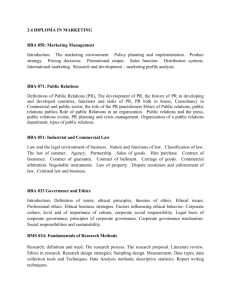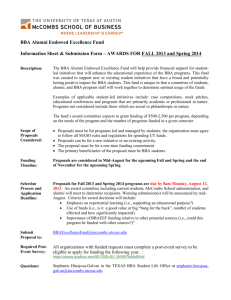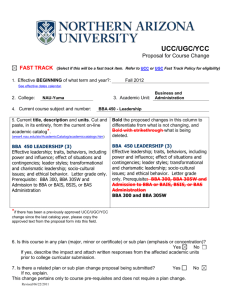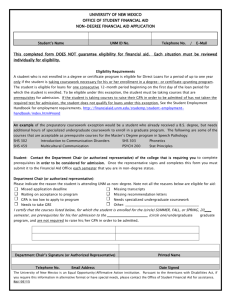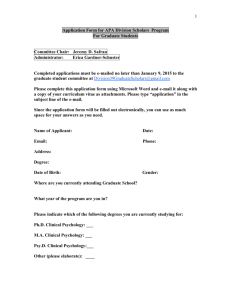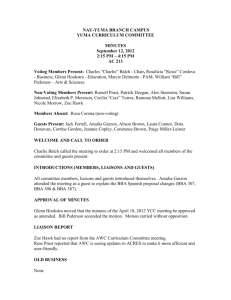BUS_iACC - The University of Texas at Austin
advertisement
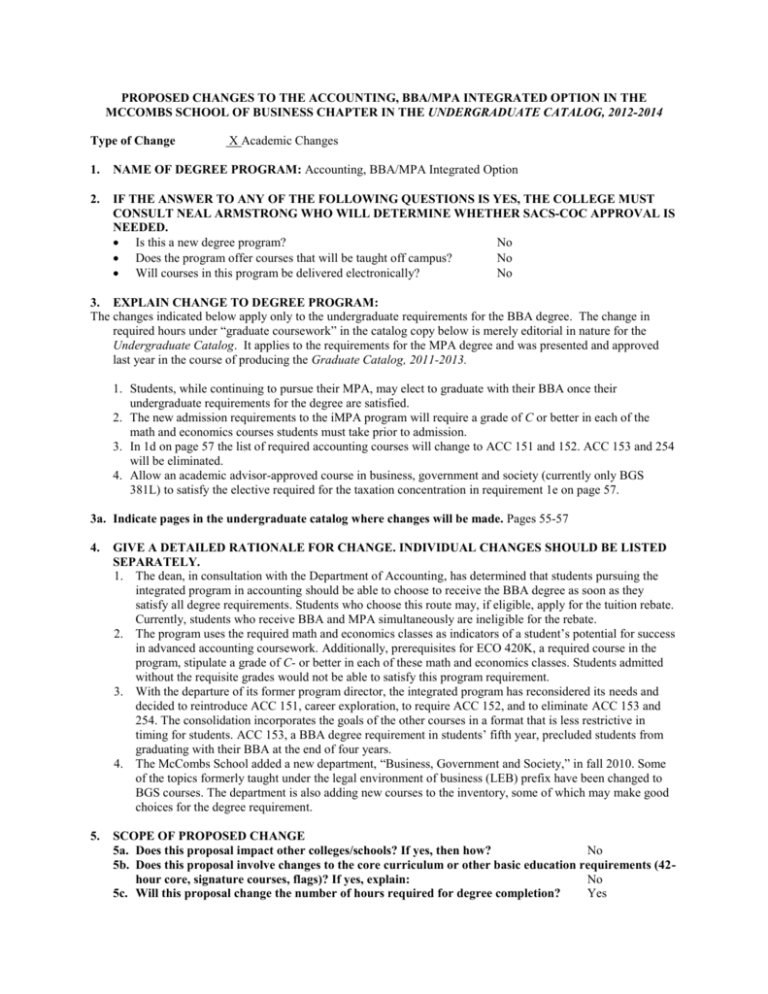
PROPOSED CHANGES TO THE ACCOUNTING, BBA/MPA INTEGRATED OPTION IN THE MCCOMBS SCHOOL OF BUSINESS CHAPTER IN THE UNDERGRADUATE CATALOG, 2012-2014 Type of Change X Academic Changes 1. NAME OF DEGREE PROGRAM: Accounting, BBA/MPA Integrated Option 2. IF THE ANSWER TO ANY OF THE FOLLOWING QUESTIONS IS YES, THE COLLEGE MUST CONSULT NEAL ARMSTRONG WHO WILL DETERMINE WHETHER SACS-COC APPROVAL IS NEEDED. Is this a new degree program? No Does the program offer courses that will be taught off campus? No Will courses in this program be delivered electronically? No 3. EXPLAIN CHANGE TO DEGREE PROGRAM: The changes indicated below apply only to the undergraduate requirements for the BBA degree. The change in required hours under “graduate coursework” in the catalog copy below is merely editorial in nature for the Undergraduate Catalog. It applies to the requirements for the MPA degree and was presented and approved last year in the course of producing the Graduate Catalog, 2011-2013. 1. Students, while continuing to pursue their MPA, may elect to graduate with their BBA once their undergraduate requirements for the degree are satisfied. 2. The new admission requirements to the iMPA program will require a grade of C or better in each of the math and economics courses students must take prior to admission. 3. In 1d on page 57 the list of required accounting courses will change to ACC 151 and 152. ACC 153 and 254 will be eliminated. 4. Allow an academic advisor-approved course in business, government and society (currently only BGS 381L) to satisfy the elective required for the taxation concentration in requirement 1e on page 57. 3a. Indicate pages in the undergraduate catalog where changes will be made. Pages 55-57 4. GIVE A DETAILED RATIONALE FOR CHANGE. INDIVIDUAL CHANGES SHOULD BE LISTED SEPARATELY. 1. The dean, in consultation with the Department of Accounting, has determined that students pursuing the integrated program in accounting should be able to choose to receive the BBA degree as soon as they satisfy all degree requirements. Students who choose this route may, if eligible, apply for the tuition rebate. Currently, students who receive BBA and MPA simultaneously are ineligible for the rebate. 2. The program uses the required math and economics classes as indicators of a student’s potential for success in advanced accounting coursework. Additionally, prerequisites for ECO 420K, a required course in the program, stipulate a grade of C- or better in each of these math and economics classes. Students admitted without the requisite grades would not be able to satisfy this program requirement. 3. With the departure of its former program director, the integrated program has reconsidered its needs and decided to reintroduce ACC 151, career exploration, to require ACC 152, and to eliminate ACC 153 and 254. The consolidation incorporates the goals of the other courses in a format that is less restrictive in timing for students. ACC 153, a BBA degree requirement in students’ fifth year, precluded students from graduating with their BBA at the end of four years. 4. The McCombs School added a new department, “Business, Government and Society,” in fall 2010. Some of the topics formerly taught under the legal environment of business (LEB) prefix have been changed to BGS courses. The department is also adding new courses to the inventory, some of which may make good choices for the degree requirement. 5. SCOPE OF PROPOSED CHANGE 5a. Does this proposal impact other colleges/schools? If yes, then how? No 5b. Does this proposal involve changes to the core curriculum or other basic education requirements (42hour core, signature courses, flags)? If yes, explain: No 5c. Will this proposal change the number of hours required for degree completion? Yes It will reduce the minimum number of hours required for the degree from 121 to 120. 6. COLLEGE/SCHOOL APPROVAL PROCESS Undergraduate Program Committee approval date: September 9, 2011 College approval date: September 23, 2011 Dean approval date: September 23, 2011 [P AGE S 5 5 -5 7 ] PRO G RAM D E GR E E RE Q U I R EM E N TS ACCOUNT ING Two programs are available to students who wish to study accounting at the University. The first is the four-year major in accounting leading to the Bachelor of Business Administration degree. The second is the five-year integrated approach to the Master in Professional Accounting degree, which leads to the [simultaneous] award of both the BBA and the Master in Professional Accounting degrees. The objective of the BBA accounting curriculum is to provide students with a broad overall education, solid grounding in the common body of knowledge of business administration, and exposure to accounting in sufficient depth to help them achieve entry-level competence for pursuit of a career in industry. The integrated approach is designed for students who wish to concentrate in accounting and obtain education in an accounting specialization. BACHELOR OF BUSINESS ADMINISTRATION [no change] BBA/MPA: INTEGRATED APPROACH The integrated approach to the Master in Professional Accounting is a five-year program of undergraduate and graduate coursework that allows the student to earn the BBA and the Master in Professional Accounting (MPA) degrees [at the same time]. The professional curriculum, which usually begins in the student’s junior year, includes specially designed accounting courses taught in relatively small classes by full-time faculty members. The accounting faculty has designed three concentrations within this program: auditing/financial reporting, managerial accounting/control, and taxation. Each concentration is a sequence of courses that offers strong preparation for a particular career path. In addition, the student may choose a generalist curriculum. Because MPA graduates are expected to become leaders in the accounting profession, highly motivated students with the personal qualities and intellectual capacity to establish successful careers in public accounting, industry, not-for-profit organizations, and higher education are encouraged to apply. Admission Students are admitted to the integrated approach according to the following requirements. Admission is granted only for the fall semester; June 1 is the application deadline for those who wish to begin the program the following fall. Students interested in this program must have met the following requirements by the June 1 deadline: the foreign language requirement for the BBA degree; and completion of at least sixty semester hours of coursework, including Accounting 311 and 312, Business Administration 101H, 101S, or 101T, Economics 304K and 304L with a grade of C or better, and Mathematics 408C or 408K with a grade of C or better, and Mathematics 408D or 408L with a grade of C or better. As stated in the BBA Degree Requirements, “A student may not repeat for credit or grade points any course in which he or she has earned a grade of C- or higher.” Students who earn a D+ or lower in one or more of the courses listed above for admission may retake the course(s), but subsequent attempts will not be considered for admission purposes. Admission is based on the applicant’s University grade point average and SAT Reasoning Test or ACT scores, as well as other relevant examples of academic ability and leadership. An applicant with a University grade point average of less than 3.00 is unlikely to be admitted to this program. Admission may be restricted by the availability of instructional resources. Application materials and information about deadlines are available at http://www.mccombs.utexas.edu/mpa/integrated-mpa. Before beginning the fifth year, integrated approach students must be admitted to the MPA program. Students must complete at least two long-session semesters in residence in the MPA program. Application forms must be submitted by February 1 of the student’s fourth year. Students must have completed the following BBA degree requirements before the application deadline: Rhetoric and Writing 306, English 316K, and BA 324. They must also earn an acceptable score on the Graduate Management Admission Test (GMAT) and have their test scores sent to the University’s Office of Admissions. Students usually take the GMAT in the fall or winter of their fourth year. Satisfactory Progress [no change] Probation [no change] Dismissal [no change] Graduation A student may elect to receive the BBA upon completion of all undergraduate requirements. The additional requirements for graduation pertaining to the BBA degree are listed on page 52. To receive an MPA degree, a student must have a grade point average of at least 3.00 in all coursework taken as part of the minimum thirty-five [six] hour MPA degree. He or she must also have a grade point average in graduate accounting coursework of at least 3.00. Degree Requirements The requirements of this program are 1. Undergraduate coursework a. The core curriculum requirements described in chapter 2 and the BBA degree requirements on pages 54–55. Because the integrated approach includes a graduate-level internship course, students may forgo the undergraduate internship course described in requirement 7e of the BBA degree requirements. b. Economics 420K. c. Operations Management 335 and Management 336 and 374. d. The following courses: Accounting 151,152,[or 153, 254,] 355, 356, 358C, and 359. e. For students in the auditing/financial reporting, managerial accounting/control, or generalist concentration, Finance 367 and a business elective; for students in the taxation concentration, Finance 367 and three semester hours of coursework in Legal Environment of Business or Business, Government and Society approved by the student’s academic adviser. f. Additional elective work, if necessary, to provide a total of at least [121] 120 semester hours of undergraduate coursework. 2. Graduate coursework a. Accounting 380K (Topic 1: Financial Accounting Standards and Analysis I) and 380K (Topic 13: Information Technology for Accounting and Control). b. [Thirty] Twenty-nine additional semester hours of graduate coursework, including at least twelve hours in accounting and no more than six hours outside business. The student’s academic adviser must approve coursework in the student’s concentration in advance.

